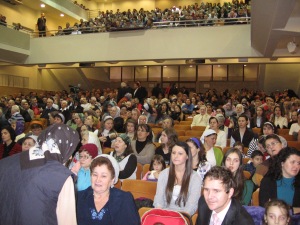“How long does the caroling usually last?” I casually asked the woman sitting next to me. The Romanian Pentecostal church service—over an hour of music performed by a brass band, choir, and orchestra followed by two sermons lasting over another hour— had just come to a close, and now we were preparing to rehearse the handful of songs we would be singing during the Christmas Eve caroling.
“Last year we started at 9:30 p.m. and we finished at 4:30 a.m.”
I gasped and stared at my new friend, shocked. “Excuse me? This lasts all night?”
“Yes, but last year we only did 20 houses and this year there are 25 on the list.” Little did I know that most of the young people do the caroling over the three nights that make up Romania’s Christmas celebrations.
Romania is laden with numerous and rich Christmas traditions —some of which, like the caroling tradition, date to a pre-christian origin. Many of those, particularly the ones with Christian overtones, were repressed during the Communist years between 1947-1989.
“Going caroling has special meaning for me,” my Romanian friend told me. 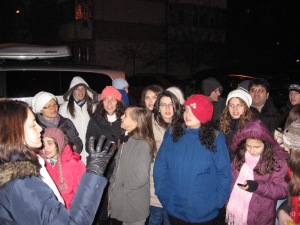 “During Communism, caroling was the one time Christians could engage in Christian activity outside of the church. I looked forward to it all year long.”
“During Communism, caroling was the one time Christians could engage in Christian activity outside of the church. I looked forward to it all year long.”
“Don’t people get annoyed when you start singing songs outside of their house at 3 in the morning?” I asked her niece.
“I remember when I was a little girl I was too excited to sleep the night we knew the carolers were coming. We would stay up all night and wait for them, with cakes and fruits and tea.”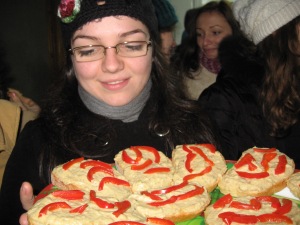
And indeed, at every one of the 25 houses we visited, young and old came out to hear our two songs, sung in perfect 4-part harmony. Afterward, they carried around trays of cakes, fruits, sandwiches, urging us to take more.
“This house has the best cakes,” one girl informed me. “You have to try this one!”
But I was no longer fooled—I had heard that claim at the last four houses and my stomach was already groaning in protest. I looked at my watch: 1 a.m. and 9 houses down. “Wow,” I thought, “we have a long way to go.” I was tired—but thoroughly enjoying the experience of immersing myself in another culture’s tradition. My Romanian lyrics were even getting better (or so I assured myself) with each house—I would belt out the few words I had mastered and then let my voice sink to a faint hum for the many that seemed impossible to pronounce.
As we got in the car to go to the next house, the niece handed me a napkin with a piece of cake. “This is the best cake—you have to try it.” Sighing, I thanked her and took a bite. When in Romania….
I was amazed and gratified that most of the caroling group was made up of young people (Because indeed, who can handle staying up all night for three nights in a row other than people who are 25 and under?). The young people are actively involved in the music of this 2000 member Romanian Pentecostal Church. Rich music seems to be interwoven in the church’s DNA, and the orchestra’s occupants range from professional musicians to young children who are just learning their 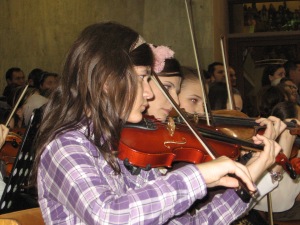 instrument. The result is an ongoing and evolving pool of musicians.
instrument. The result is an ongoing and evolving pool of musicians.
For these Romanian Pentecostals, the Christmas 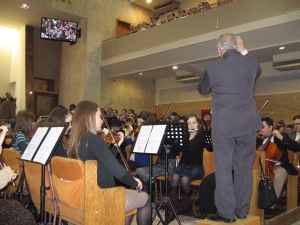 festivities center around the church community, as they attend numerous services throughout the three days of Christmas. Although so many services were a bit daunting for someone like myself who usually only attends a Christmas Eve service in America, I found myself challenged by the passion and sincerity with which the birth of Christ was celebrated.
festivities center around the church community, as they attend numerous services throughout the three days of Christmas. Although so many services were a bit daunting for someone like myself who usually only attends a Christmas Eve service in America, I found myself challenged by the passion and sincerity with which the birth of Christ was celebrated.